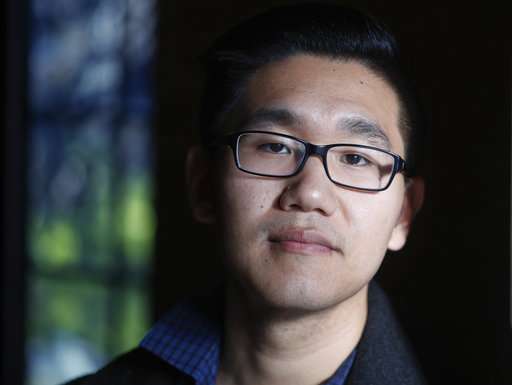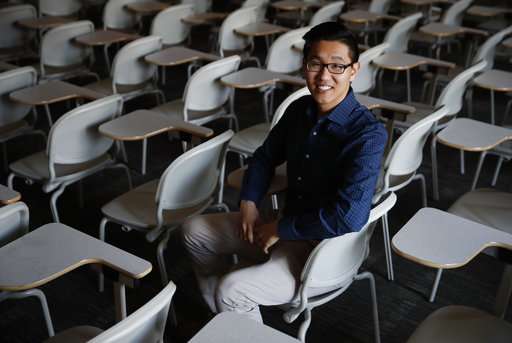Graduate students to protest proposal to tax tuition waivers

Graduate students around the U.S. are staging campus walk-outs and lobbying Congress in an effort to keep their tuition waivers tax-free.
They have the support of their schools in arguing that a provision in the House Republican tax bill could, as graduate student Shawn Rhoads says, "upend the American Ph.D. system."
Rhoads is pursuing a doctorate in neuroscience at Georgetown University. He worries that if the House tax bill becomes law, his annual tax bill would balloon so high that he'd be unable to make ends meet.
"It's an outrageous financial burden for graduate students," said Rhoads, 24, who works as a research and teaching assistant at the university in the nation's capital.
Many schools waive tuition as a benefit for students who work as teaching or research assistants while pursuing advanced degrees. Under current rules, it's not taxed as income.
But the House tax bill approved in November would make the amount of the tuition waiver taxable. The Senate's version would keep the tuition waivers tax-free.
A group of graduate students from Illinois, North Carolina, California and other states announced plans to protest at House Speaker Paul Ryan's office in Washington on Tuesday, citing the waiver provision and other parts of the tax bill that they say will "devastate higher education."
Speaking at the American Enterprise Institute last week, Republican Rep. Kevin Brady of Texas, chairman of the House Ways and Means Committee, said lawmakers were listening to supporters of the waiver provision and that it would be addressed when the House and Senate try to reconcile their bills.
At the same time, Brady questioned whether the waivers were fair to students who work off campus and don't receive the same tax breaks.
"Outside of the university world, there is some controversy to the current tax provisions," he said in response to a question from a medical student.
The American Council on Education, an umbrella group representing more than 1,800 colleges and universities, estimated that higher education provisions in the House bill, including making tuition waivers taxable, would increase the cost to students attending college by more than $65 billion between 2018 and 2027.
"It would be devastating to graduate education, undermining severely our pipeline of bright new graduate students who are going to contribute to our economy in a whole range of fields, but especially in the field of STEM," said Steven M. Bloom, director of government relations for the council, referring to science, technology, engineering and math fields.

"If you were to design a set of public policy ideas meant to undermine access to higher education," he added, "you would do what the House decided to do."
Graduate students have staged walk-outs and teach-ins at schools around the country, including the University of Southern California, Harvard, the University of Minnesota, Ohio State and the University of Kansas.
More than 3,000 graduate students across the U.S. have signed a petition started at Harvard asking Congress to keep the tuition waiver.
"We bring tangible advances to our communities," said Alana Van Dervort, a Harvard graduate student and one of the letter's authors. "For instance, a new, potentially promising approach to treating cancers and genetic diseases was pioneered by students during their graduate training at Harvard and Berkeley."
Most graduate students work for their universities at some point of their education, and a report by the Council of Graduate Schools found that nearly a quarter of doctoral students received institutional tuition and fee waivers in 2012.
For universities, offering waivers can help attract top students who also work as teaching or research assistants. For students, waivers help them cover the cost of living while pursuing an advanced degree.
"We would basically be priced out of being able to afford higher education," said Steven Manicastri, a Ph.D. student and teaching assistant at the University of Connecticut. "A lot of graduate employees, they're living check to check, and you don't have a lot of time to find additional work."
Manicastri, 28, said his taxable income would more than double under the House bill. He would be hit especially hard because, as a New Jersey native, his tuition waiver covers the university's higher out-of-state tuition price, roughly $32,000 a year. He estimates the tax would cost him an extra $3,000 to $5,000 a year.
"Our incomes are so low we usually don't end up paying taxes on our income," he said.
Indiana University President Michael McRobbie said eliminating the tax waiver would disproportionately harm students in STEM fields at the nation's research universities.
"We simply cannot afford to lose ground in attracting those students who we know will drive innovation, guide the development of new technologies, and perform the type of path-breaking research that will improve our economy and quality of life," he said.
Kim Rueben, a tax policy expert with Urban Institute, a left-leaning think tank, said that while a tax reform could indeed boost the economy, this bill would do the opposite.
"In terms a tax bill that wants to encourage growth and economic well-being for people, it's going in the wrong direction," Reuben said. "It's just not good tax policy or tax reform."
© 2017 The Associated Press. All rights reserved.


















